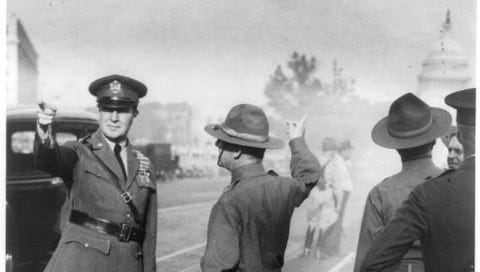There's a Dangerous Misconception About the Military's Obligations to the President
My Essay in The New York Times
Douglas MacArthur scares me.
He certainly had an extraordinary ability to devise and execute audacious military operations. But MacArthur also had a disturbing record of inserting the military into domestic politics. In 1932, for instance, he went beyond his directives and ordered U.S. troops to attack thousands of unemployed military veterans who had amassed in Washington D.C. to demand bonus payments. And, nearly instigating World War Three, he flagrantly disobeyed orders and publicly pitted himself against President Truman during the Korean War.
What MacArthur’s behavior highlights is the danger the military inherently poses to the society it exists to protect. If we are to have a military, we must find ways to minimize the danger of officers who might seek to use it against civil society. One way of managing this risk is to instill the value of subordination to civilian authority into the laws and ethos of the military. As long as the military is structured to be a tool of, and never an antagonist to, the president, we needn’t worry much about the military using its power to influence politics.
This is certainly a solution to the problem of rogue officers the U.S. and other societies have pursued. The American military is overwhelmingly designed to ensure obedience to the commander in chief.
But Donald Trump scares me too.
If you think he has decent policy objectives and knows how to achieve them, I won’t disagree with you here. My concern is Trump’s disturbing record of seeking to insert the military into domestic politics. This was illustrated recently by his use of graves at Arlington National Cemetery as props to attack his political opponents. But in the last months of his presidency, he tried to do worse. For instance, in 2020 he sought to deploy the military to confront largely peaceful protesters who were demanding racial justice. And it appears he is willing to go even further if he is reelected in November.
What Trump’s behavior demonstrates is another danger the military inherently poses to the society it exists to protect. The civilian commander of the military, however legitimate, might seek to use the military to attack civil society. This danger is heightened by the above solution to the problem of rogue officers. The more we aim to unite the military under the commander in chief, the more difficult it is to stop a president from weaponizing the military against civil society.
Since Trump left office, many scholars have wondered how the military should respond to a president who does not respect the impartiality of the military.1 In most cases, they have concluded that the conventional tools of military law and ethics are inadequate to the task, and we need to implement reforms. I agree that new laws and ethics education are necessary. But I think our conventional ethical resources are more helpful than is being appreciated. In fact, the failure to recognize the sophistication of conventional norms reveals a dangerous misunderstanding about the role of the military in a democracy.
My essay in The New York Times this morning is my attempt to explain what has been missed and why it matters. Contrary to the commentators, I think that our military ethics has in fact been built, however imperfectly, to deal with presidents who disrespect the political neutrality of the military. The ethics of a professional military in a democracy is, and always has been, about more than obedience to the president. If we haven’t seen this, it is because we have never before had a president who forced us to look.
I am so thankful to Thomas Carnes, Daniel Maurer, and James Ryerson for helping me put my thoughts together.
Unfortunately, my position does not make life any easier for military leaders serving under a president who wants to use the military as a political weapon. While it gives reasons to resist potentially legal orders that threaten the political neutrality of the military, my stance doesn’t specify exactly what orders to resist or how. These agonizing questions are raised by my position, not settled by it. I do not enjoy saddling military leaders with painful challenges like these. But, whether we like it or not, the ethical burdens of military leadership in a democracy are unavoidably harrowing.
Perhaps in the future I will have something useful to say about how and when to resist presidents who would violate the political neutrality of the military. In the meantime, I hope we agree that militaries in democratic societies are bound to resist being turned into the executive’s political instrument.
See Risa Brooks, “Paradoxes of Professionalism: Rethinking Civil-Military Relations in the United States,” International Security, vol. 44, no. 4 (Spring 2020): 7-44; Pauline Shanks Kaurin, “An ‘Unprincipled Principal’,” Strategic Studies Quarterly, vol. 15, no. 2 (Summer 2021): 50-68; Daniel Maurer, “The Generals’ Constitution in Extremis: Civil Rights, Civilian Control, and a National Security Commitment ‘Most Severely Tested’,” unpublished manuscript; and Jim Golby and Mara Karlin, “The case for rethinking politicization of the military,” Task & Purpose, June 12, 2020.



